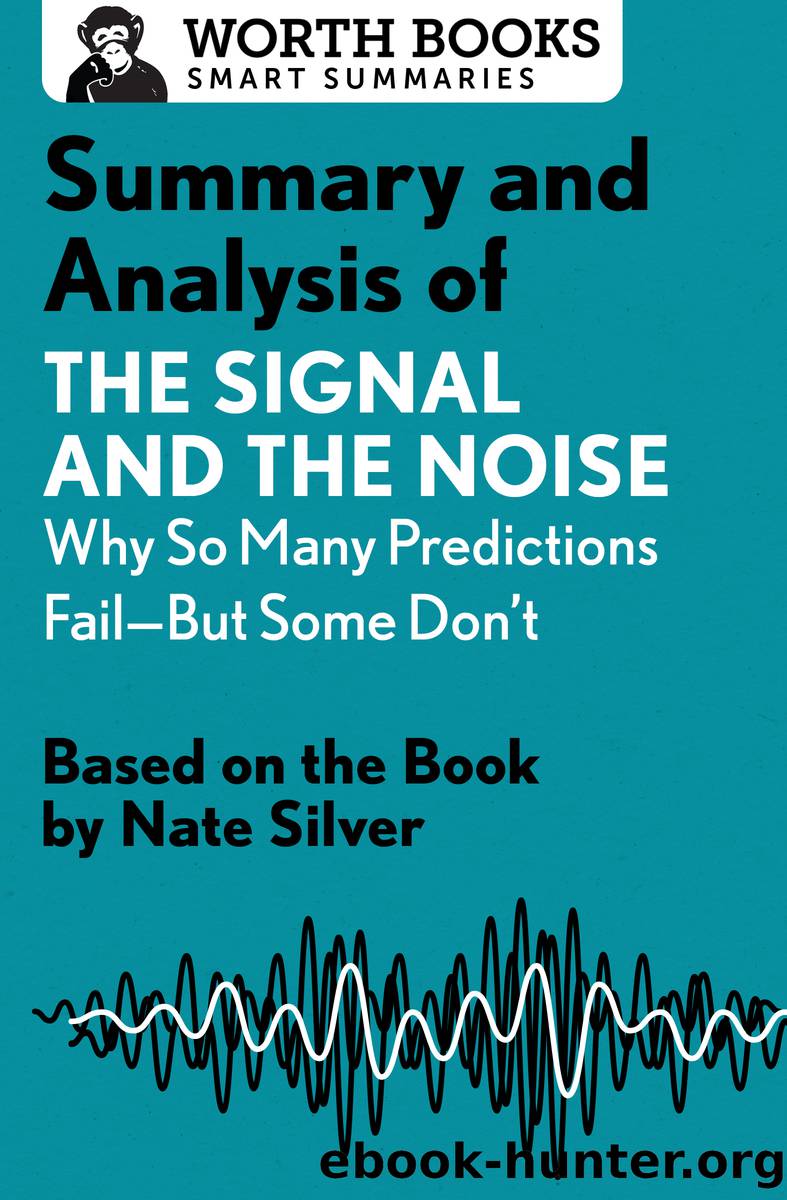Summary and Analysis of the Signal and the Noise: Why So Many Predictions Fail--But Some Don't by Worth Books;

Author:Worth Books;
Language: eng
Format: epub
Publisher: Worth Books
Published: 2017-01-03T21:54:48+00:00
Direct Quotes and Analysis
âThe instinctual shortcut that we take when we have âtoo much informationâ is to engage with it selectively, picking out the parts we like and ignoring the remainder, making allies with those who have made the same choices and enemies of the rest.â
With the Internet, the average person is now bombarded with an unmanageable amount of information, and it is human nature to gravitate toward the data that fits with our existing worldview. But this only leads toward sectarianism. It is, of course, far wiser to consider more than one data point when forming an opinion and to listen to other points of view.
âThe numbers have no way of speaking for themselves. We speak for them. We imbue them with meaning.â
By the act of using raw data, we are filtering them through our own biases and experiences. Numbers can be deliberately manipulated or cherry-picked to tell a certain story; more benignly, even an attempt to present opinionated data must be processed through our brains. So beware of making a decision and then finding the right data to back it up; look at all the relevant information that you can.
âSome of you may be uncomfortable with a premise that I have been hinting at and will now state explicitly: we can never make perfectly objective predictions. They will always be tainted by our subjective point of view.â
This is one of Silverâs main points. Acknowledging that we are working toward an objective truth, rather than already possessing it, encourages us to incorporate new data and be open to changing our perceptions of the truth, rather than seeking data that affirms our own beliefs.
âGreed and fear are volatile quantities, however, and the balance can get out of whack. When there is an excess of greed in the system, there is a bubble. When there is an excess of fear, there is a panic.â
Many things cause economic instability, but a key factor is the reactions people have to economic conditions. When there is a bubble, it is better to sell and have some fear; when there is a depression, it is better to buy and have some hope.
âWhen we are making predictions, we need a balance between curiosity and skepticism.â
This is the sum of Silverâs thesis and focuses again on Bayesian theory and human bias. He argues that, when it comes to the business of making predictions, it is unlikely that any person or program will always be right. Itâs critical to expand your data sets as often as possibleâand to continually question what you think you know. The more âskepticalâ you are, the better a chance you have to uncover the truth.
Download
This site does not store any files on its server. We only index and link to content provided by other sites. Please contact the content providers to delete copyright contents if any and email us, we'll remove relevant links or contents immediately.
Hit Refresh by Satya Nadella(8346)
The Compound Effect by Darren Hardy(7576)
Change Your Questions, Change Your Life by Marilee Adams(6658)
Nudge - Improving Decisions about Health, Wealth, and Happiness by Thaler Sunstein(6644)
The Black Swan by Nassim Nicholas Taleb(6205)
Daring Greatly by Brene Brown(5652)
Deep Work by Cal Newport(5501)
Principles: Life and Work by Ray Dalio(5335)
Rich Dad Poor Dad by Robert T. Kiyosaki(5167)
The Myth of the Strong Leader by Archie Brown(4796)
Man-made Catastrophes and Risk Information Concealment by Dmitry Chernov & Didier Sornette(4749)
Big Magic: Creative Living Beyond Fear by Elizabeth Gilbert(4736)
The Slight Edge by Jeff Olson(4730)
Discipline Equals Freedom by Jocko Willink(4642)
Digital Minimalism by Cal Newport;(4569)
The Motivation Myth by Jeff Haden(4536)
Stone's Rules by Roger Stone(4423)
Management Strategies for the Cloud Revolution: How Cloud Computing Is Transforming Business and Why You Can't Afford to Be Left Behind by Charles Babcock(4136)
The Doodle Revolution by Sunni Brown(4051)
